Sign In to Your Account
Subscribers have complete access to the archive.
Sign In Not a Subscriber?Join NowMum Memoirs
James Wolcott
BOOKS
Once again Wilfrid Sheed is sorting through the wet laundry and hanging out his past to dry. A critic, novelist, and intellectual dove (he was baptized with tear gas in Chicago, 1968), Sheed has always held a moistened finger to the wind, checking for subtle shifts in the Zeitgeist. And his readings are usually dead-on. Lately, however, Sheed has been heeding a nostalgic refrain. Down memory lane he strolls, his jacket slung over his shoulder Sinatra-style, as familiar tunes waft from the jukebox. Sheed's new book, Frank and Maisie: A Memoir with Parents (Simon and Schuster), finds our hero retracing his steps all the way back to the stones of Florence, where, his mother claims, he was conceived. A fabulous start! But Sheed didn't quite pop into view to a blast of trumpets: "I crept reluctantly into the world, like a grumpy old man, nineteen days late, just enough to ruin the Christmas of 1930 for everyone." One can almost picture little Wilfrid in his crib, puffing on a cigar and preparing for that fateful day when he would meet John Leonard. He must have been polishing his punch lines before he cut his first toothie.
Sheed's parents, Frank Sheed and Maisie Ward, were the chariot wheels of the Catholic Revival, bringers of light at a time when Catholicism appeared to many a backward code policed by crafty priests and crazed, whacking nuns. Legions of words marched in the dust of these ever spinning wheels. Not only did both lecture and write (Maisie did fat, groaning biographies of Robert Browning and G. K. Chesterton), but they founded a publishing house whose star author was that saber thrust of provocation, Hilaire Belloc. Largely forgotten now, their publishing house defunct, Sheed and Ward were semi-known in their time, and young Wilfrid got a lot of deflected attention. "What's it like being the son of Sheed and Ward?" he was often asked, a question he interprets to mean, "Doesn't all that fame make you feel insignificant and hopeless?" His response: "If that's the question, I can only shrug." There's entirely too much shrugging in Frank and Maisie, too much professed nonchalance and bland candor. Sheed seems to keep his moodier emotions pacing behind the curtain while out front, pulling silver coins out of his ears, he keeps up a steady flow of patter.
For a memoirist, Sheed is curiously mum about friends, wives, and beloved acoms ("Our three remarkable children, Liz, Frank and Marion, will have to wait for another book—or else write it themselves"). No cheeping birds attend the dawn of his literary promise. "There is nothing drearier than accounts of 'how I became a writer,' " he says, and suggests that in his family writing wasn't dash and vision but expert drudge work, like dentistry. Even his polio is treated like a mere inconvenience, a minor crimp in his style. He insists on keeping everything light and genial, yet you can sense a pain, a disappointment, deeper than where he dares to probe. I'm not saying that Sheed should make like Leonard Michaels or John Osborne and point to every dried pool of blood on the floor, but why write a memoir if you're going to keep so many things closeted? To honor my parents, Sheed might reply. But Sheed already honored his parents handsomely in an essay published in The Good Word & Other Words, a capsule version of this current book. Indeed, much of Frank and Maisie has an idle, recycled feel. At the end of nearly six hundred manuscript pages of Frank and Maisie, I was startled to read, "In this book, I have only hinted at [my parents'] achievements and scarcely mentioned their books, which I leave to some better scholar than they were able to produce themselves." Sheed's can'tbe-bothered tone is a little chilling.
Wilfrid Sheed has always been a curiously undramatic writer—a talker, not a doer. In his novel Max Jamison, he acquainted the reader with every inky crevice of his antihero's mind but couldn't make the character move. But if Sheed is a talker, he's an awfully good one, and Frank and Maisie often has the breeziness of a man letting his mind run barefoot. Like his muttering idol, W. C. Fields, Sheed is a master of the throwaway aside: "Frank used to quote a line to me of Hilaire Belloc's to the effect that monarchy was the only form of government where you didn't get your hands dirty reaching for power (your nose might be another story)." "So long as their talk was tough and their thoughts were tough, they could be working-class forever, like certain proletarian novelists and Village Voice writers." Sheed is also affectionately funny about Bishop Fulton J. Sheen, who flapped his robes on TV like Bela Lugosi and tried to boogie-eye the viewer into salvation. And Australia, where the Sheed-family saga often takes him, sparks some good pages. The problem is that everything enjoyable about Frank and Maisie seems incidental. The embroidery is fine, but the carpet itself has faded. How I wish Wilfrid Sheed would return to criticism. Sheed the critic cut a lot more ice than Sheed the dispenser of "amusing" anecdotes.
 View Full Issue
View Full Issue












Subscribers have complete access to the archive.
Sign In Not a Subscriber?Join Now